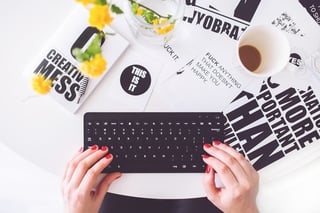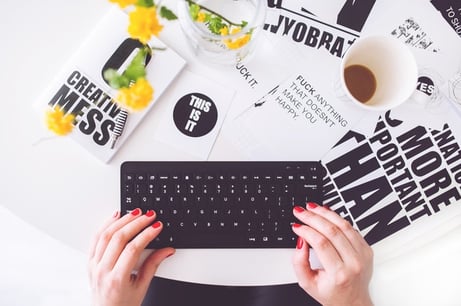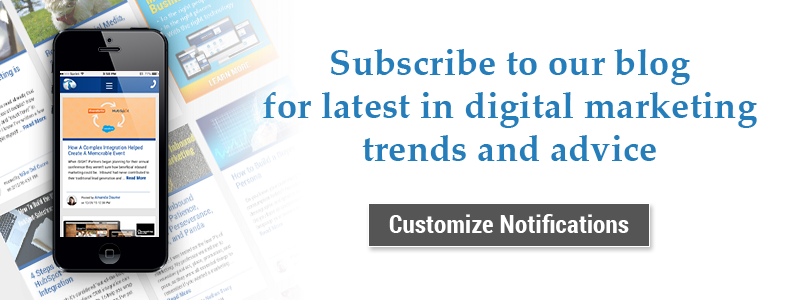

As I begin to write this blog, I shudder as I look at the date, October 30, 2017. I managed to dig myself out of this month’s assignments of projects for our growing list of clients, but my time is almost up in my monthly contribution to writing a thought piece. I watch the time pass as I run through a mental list of topics that are important to me right now, but consistently draw a blank, ultimately adding stress but losing momentum.
Then, I realized I’m overthinking it. I’m ultimately losing my creativity because of the pressure of the deadline, and it certainly hasn’t been the first time. They say diamonds are created under pressure, but I strongly disagree; free-thinking, time management, and progress checkpoints are what cultivate a flawless F1 diamond. Creativity blossoms under a healthy lifestyle, point blank.
Create Mini Deadlines
If a project is large and daunting, it’s more likely to keep you up at night thinking about how much has to be done, rather than it being done itself. When the deadline begins looming in the horizon, you find yourself running around like a chicken without its head, scrambling to put something together that would be justifiably good but this happens that it’s not ultimately creative.
Many notable figures have proclaimed “The best way to get something done, is to begin” of course within their own variation. Instead of beginning and ending all at once, spread time for your project by breaking up the project in multiple mini-deadlines. For example, if you're creating content or designing material break it up into 3 steps: Conceptualize or draft, create, critique, then back to the drawing board for revisions. Be sure to leave room between the due date and revisions because you'll find that you could go back to the drawing board more than once. This lets you see your own progress as you near completion and prevents you from meeting everyone’s most vindictive enemy – procrastination. Moreover, it helps you find meaning in the pressure because you have a little goal within every task which helps you paint a larger picture that you want to achieve.
Isolate Yourself from Distractions
I can’t tell you a number of times I would go to the library back in college with the intention of working for 2 hours and going home, but would end up on Facebook during a 5-minute break and would ultimately browse the internet for the next half hour. Website blockers, such as this one, became my best friend because it let me reach my goal in an attainable amount of time, and reduced the need for all-nighters. Today, I find them to be just as important and relevant in the workplace.
Reduce distractions at work itself. Ask yourself, do you really need to go to a meeting? Often, I find that they’re just time-consuming and don’t let you think as clearly as you would in an isolated room. If you must bounce ideas off someone, find a coworker who understands the problem or task as much as you do to discuss ideas. Send updates to whoever is relevant but don’t block time out of your day for a project which would require multiple revisions anyways.
Recharge Your Batteries
Mental and physical health is essential to being productive. I cannot emphasize this enough. During lunch, incorporate a break to go on a walk. Get enough sleep, you can’t work properly with a foggy brain. Eat your vegetables and watch your sugar intake, especially at work. The last thing you want to have is a crash on a deadline heavy schedule.
If you’re working steadily for hours, take 5 minutes to stretch or to say hello to a co-worker or friend, you’ll find that when you come back to the desk you’ll feel more productive. Remember, it’s a marathon, not a sprint.
Keep Your Eyes Peeled for Inspiration
Almost 10 years ago, someone told me “Life passes you by while you’re looking at your phone” This has stuck with me for years. I think about it almost every day, especially if I’m traveling or a passenger in a car. Grace Coddington, the Editor and Chief at Large of Vogue said in route, while on an interview in London “Keep your eyes open, you never know what will inspire you.” The point that I’m getting at is, be aware of your surroundings, they drive inspiration. Creativity, rarely if ever, comes from thin air.
If you're a designer, keep your eyes peeled for commercials, outfits, and even conversations. When you're working, your experiences or interactions with the world will likely appear in your designs. On the end of the creative spectrum, if you're a writer, analyze your content. Go back to the drawing board and look at metrics, see what's working and what isn't. You're likely to see trends with viewers interactions and it could push your content creation in a beneficial direction to all parties.
Error Is Essential to Creativity
I took two semesters of Research & Development classes, which used to be the silliest and most liberating classes I could have possibly asked for. Using the information we had, we used to think of creative and wacky ideas which ultimately lead to innovation and productivity. I’m not saying that in a work setting you necessarily have the time or the luxury of being silly, but don’t be afraid to make mistakes because an incredible idea can come from your revisions. Rigid outlines are efficient, but they leave no room for creativity which could make your work stand out.
Instead, use the same method content writers would use to maximize optimization- look at the information you already have and analyze it. If you made mistakes, that's okay, but learn from them and use creativity to improve. The information you've already set forth to the world turns into valuable data that speaks volumes of the consumers, readers, and trends.
In closing, look at what’s been setting you back in terms of productivity and what’s been working. Being aware of the pressure of time isn’t what’s killing your creativity but rather your productivity. Live a healthy lifestyle, and refrain from letting the fear of a deadline consume you, because over the passing of time that fear is only going to get heavier. Remember, a sturdy house isn’t built overnight so set goals and revise as you see creative progress come together.

